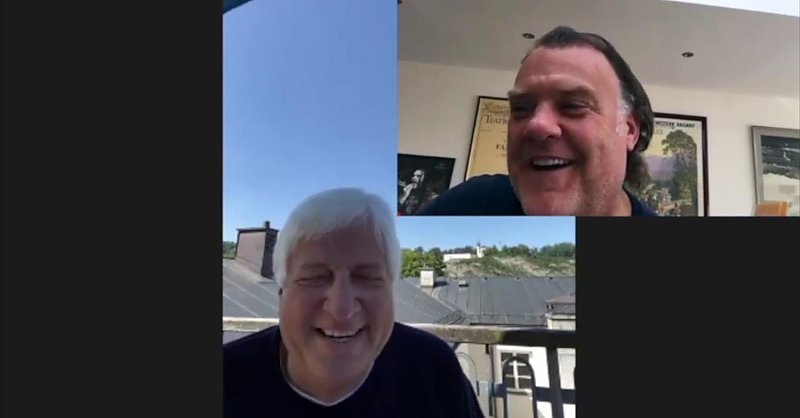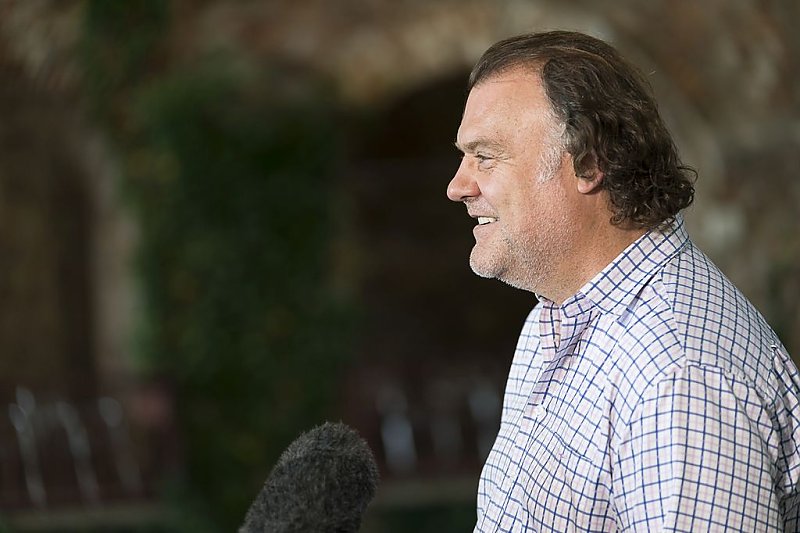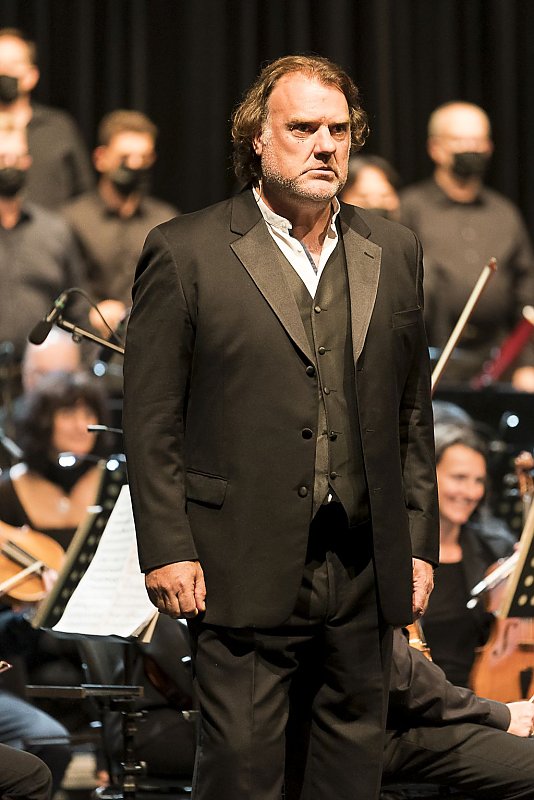Interview with Sir Bryn Terfel on the occasion of his first Pizarro in Graz – 7. August 2020
“I just want to perform“

Interview mit Sir Bryn Terfel
Klaus Billand: Good morning Sir Terfel, it is phantastic to see you!
Sir Bryn Terfel: Good morning, it looks like clear blue sky where you are…
I am sitting on the rooftops of Salzburg, the famous festival town and behind you can see the Museum of Modern Art, on the „Mönchsberg“.
Ah, do you live in Salzburg?
I “live” in many opera cities but basically in Vienna. In July and August, we are usually touring around to Bayreuth, Salzburg and also to others.
Oh, what a life! You are the vagabond of opera cities.
So to say, I am the ambulant reporter of Wagner new productions for „Der Neue Merker“, the Austrian Opera Magazine.
Wow, amazing! You must have seen so many fabulous productions…
I saw you in the Royal Opera House London, “The Flying Dutchman”, phantastic, Andris Nelsons was conducting. And I also saw your Wotan in the Warner „Ring“.
You are now in a city that was very very important for the nourishment of my career in the beginning, Salzburg and Gerard Mortier.
Really? Let us know more about it, it’s interesting!
Well, I sang Sprecher in „Die Zauberflöte“ in Brussels and Gerard Mortier heard me sing that one page of glorious music and immediately offered me the role of Geisterbote in „Die Frau ohne Schatten“, also the new production of „Salome“ with the crazy Luc Bondy and the wonderful Christoph von Dohnànyi. „Die Frau ohne Schatten“ was my first experience of singing abroad, of being away from family and your loved ones but, of course, it was the natural progression. When you have to work you have to sacrifice…
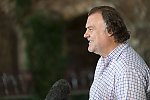
Sir Bryn Terfel in Graz
For instance, I heard once Christian Thielemann say that he cannot see the hotels anymore. I mean, this is the life of you guys, the more success you’ve got, the more you are separated from your loved ones.
Indeed! And, learning and looking at “Fidelio” at the moment, apparently the last thing, when his publisher gave him twelve bottles of wine, Beethoven said was: „Too late, too late, far too late“. So, I don’t want to turn around at the end of my career and say: I wish I had done that; but I feel that I have had the necessary ammunition in the sense of singing the correct roles when I was young which gave me a wonderful platform and the bridge into roles like Barak in „Die Frau ohne Schatten“ and of course now with my very short career in the Wagnerian sense of „Tannhäuser“ in New York and „Der fliegende Holländer“ in the Royal Opera House. And I count my blessings that I could sing Hans Sachs on my home stage here in Cardiff, in Wales, most probably what is essentially the longest role ever written for the bass-baritone voice… I do consider Wagner as a wonderful composer to sing because he has dynamics and he has incredible dramatic scenes that you can sing in every style. You could sing in any dynamic that you want to sing, as even a Lied singer would interpret some of the sections of the “Ring” cycle for instance, or Hans Sachs. So no, it’s been quite an emotional journey.
Life will bring different things, so the hurdle of the pandemic. It’s now up to opera houses to think outside of the box and maybe consider changing certain things.
This is what I actually like to discuss with you because you are a very prominent figure in the international opera scene, worldwide known. How do you think that this corona-virus pandemic will affect the cultural sector in general? Will we ever be able to come back to a fully seated theatre? From the virologists we keep hearing that we have to live with the virus for a long time.
There are murmurings already of different cities coping in a sense with what the pandemic has brought into our classical scene. Madrid did a number of performances of „La traviata“ with a certain grid on the stage. Do you go to the opera house to see a production or do you go to hear the singers? A little bit of both. So, obviously we are all praying for the vaccine but in a sense, maybe, the opera companies will be, in the future, developing new systems of cleaning the air, testing people when they go into the theatre. Obviously, we have to be more prepared with masks and it all boils down to how confident people will be to go into the theatre. It seems that certain companies are doing this. I have plans to do recitals in London, Munich haven’t cancelled “Tosca” yet, I know Zurich will have “Sweeney Todd” in January, so maybe they are thinking of processing the opera house in a way legal to the requirements.
We are talking of an art form which has reached the biblical age of over 420 years by now. It has passed through several world wars, through much worse epidemics and pandemics we have now. And always we have come back to a glorious continuation of this most complex, most expensive and most wonderful art form – in our view of course as opera goers. Nevertheless, I would like to ask you what do you think is behind the phenomenon that particularly in the opera sector but also in the dramatic theatre sector, the reopening after the first big wave of the virus has been much more remote and much more careful than in any other sector. If you look, Peter Gelb has closed the Met until the end of the year, in Vienna they are trying to open with certain restrictions. Considering other public meetings or get togethers we are extremely careful on the opera sector. What is behind this?
I think you have answered the question in a wonderful sense of passion. 420 years of any different styles of performance is quite exceptional. So, are we going back to the commedia dell’arte, to the troops of singers going to different villages to perform?
But then Wagner is out! Wagner is out! [Laughter]
Ha-ha! Obviously, if you position us alongside sporting venues, if they start to bring people back to support football or rugby or basketball or anything, then they have to get it right because of that second wave. I see the open-air theatre (Arena) in Verona, they had a concert with some marvelous singers.
I’ve just been there. It was extremely well done.
It was wonderful to actually see the orchestra back on the stage. I see Salzburg is going to do „Così fan tutte“. Yes, Peter Gelb has closed the Metropolitan until at least the new year but there are rumours of concert versions being applied. I think in Verona Leo Nucci is going to do “Gianni Schicchi”. In a sense, these are baby steps and of course we are all important and the audiences are very important to us as well and we want them to be incredibly safe and in an environment that they can feel comfortable in. But I know my friends in Spain, they went to the performances of “La traviata” in Madrid to hear the three casts and they felt particularly comfortable in the theatre when everybody was being careful with masks and the social guidance of simple things like using toilets, no bars… So, do we then start thinking of changing how the air system works in an opera house? Obviously, air conditioning is not good in the sense of the virus. You see spikes, I hear in Aberdeen, Scotland, one certain bar has been blamed for a spike in that city.
I just want to perform. I sang for the first time (after corona lockdown) last week here in Wales. They built three tents, the band was in one tent, the singers in another tent and the dancers in the third tent, obviously no audience. It was performed for television. So, these are the steps that one should take, to be very careful!
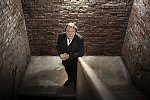
Terfel in Graz
Open-air performances are in high noon. I actually happened to see two weeks ago an open-air “Rheingold” near Sofia at Lake Pancharevo, unbelievable, can you imagine? On a big steel pontoon Professor Kartaloff, General Director of the Sofia National Opera, showed his “Rheingold” and it was a beautiful event. These are the possibilities, but in the long run we have to come back to the opera house. The society has built beautiful opera houses, they themselves are kind of light towers in cities, pieces of architectural artwork. Given this pandemic but also given other elements which are more and more intruding in our societal context and means of communication, particularly the cell phone communication, the flatness very often of the way how we communicate through all these new means, the social media, my question would be: Will that affect the role of the art form opera in the medium and long term? What is your view about that?
Well, obviously on the platform of the internet you see some elements of classical music but opera scarcely one has seen ever in the front of anything. Maybe, the home gala from the Metropolitan Opera, you saw some people doing singing duets, but on the opera stage, no! I wish sometimes that Madrid would have televised the performances of „Traviata“. I would have loved to have seen that „Rheingold“ on a lake on a stage, a little bit like Bregenz. So, who knows, maybe the directors and most importantly the set designers have to change their ways just for a little while. Maybe, a couple of years where productions are very different and, maybe, bring back those one-act operas that we dearly love like “Il tabarro“, „Gianni Schicchi“, like Walton's „The Bear“, and others. These, perhaps, could be our saviours in the operatic realm to bring a sense of, maybe, having new commissions, maybe composers writing new operas. We have to have long-term planning for this.
Should we not also think of this kind of very interesting points you made, shorter versions, getting into the houses younger audience, because generally speaking, the classical audience of the opera are beyond 45, 50 mostly 60 years, in many capitals of the world, not so much in the new opera countries like Korea, Japan and China. But in Europe, in our classical places, should it not be a major task to attract a more middle-aged audience to the opera? Despite all the other options they have got to divert themselves.
Yeah, well, I don't have the figures of the percentage of the ages that come to the opera houses. I certainly see when I'm singing in Europe that the interest of the younger generation is far greater. I would say, indeed, bring in a lot of different modern equipment, maybe, now have some fun on the stage, have some fun productions. Obviously, there are certain operas that have big choruses and big orchestras and, maybe, we will not see them for a couple of years until that vaccine is found and is tested and is correct. I know, in Vienna they have multiple sets of old productions hiding somewhere in the Burgenland. They could bring those sets back of those glory days of listening to those recordings where singers would hardly move. I remember listening to Hans Hotter singing a live performance of „Die Walküre“ and it's obvious through hearing and listening to him, he wasn't moving very much on the stage. So, maybe, these are the times to bring that and focus on the human voice.
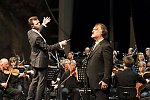
Sir Bryn Terfel unter Marcus Merkel in Graz Kasemattenbühne
I think this is the message we should have learned, that the opera is not possible without the opera singer-actor and this has very often come up short when you look at the situation particularly of the freelance singers who actually are kind of left out in the rain in this crisis, when their productions were cancelled. The opera singer is the heart of the opera! But we should also go to your Graz assignment. This is the reason why you come to Austria and we are very very happy about that. I will also be there for the third performance with a friend. What did bring you to Graz and what do you think about your engagement there and about the role of Don Pizarro which is also your role debut in „Fidelio“ of Ludwig van Beethoven?
Yes, well, I have to bring up that point: obviously, this pandemic is plowing its way through our lives rather cruelly in the sense that it affects somebody who is in the profession for 30 years as it affects young singers about to commence their career. Obviously, we try and use a platform in the last six months to help people and we have been recording things from home for Grange Park Opera for instance, just outside London, we have been doing recitals and we have been doing birthday announcements that they give money to the opera and to the team. Our wonderful tax man will always be nipping at our heels to get his payments so we need to start working and when Graz came along through Marcus Merkel and he said: „Would you come to Graz and do “Fidelio”?” immediately I thought, of course, but will it happen? That was always a question. And yes, it is a new role for me. Of course, I have sung a multitude of Beethoven Ninth Symphonies and „Missa solemnis“, some of his wonderful songs, but never Pizzaro. I always had that wonderful Karajan recording with Hans Sotin and Lucia Popp. It fits nicely into the roles of playing misfits and mal contents on the stage, so it is a story that is as apt today with the liberty justice and freedom and love!
It's a universal subject, always relevant. Committed or taken freedom is unfortunately also universal…
Yeah, of course Pizarro is quite a dramatic role, heavy singing and the tessitura is beautifully bass baritone. I have been watching some old performances on YouTube and I am actually just now looking at the second act. Sometimes in our careers, we have to learn things very quickly. So, when the green light came that the performances were going ahead, I had to strive forward to start learning. And I have a little bit of a confession: I have a baby brain at the moment, because we just welcome to the world a baby boy.
Oh, my congratulations!
Thank you very much. He was one month old last Friday and with his first screams after being born he blew away everybody’s personal protection equipment in the room, the PPE's came off with a Nothung shout – a Heldentenor was born. [Laughter] There are two flights to go to Graz, little things that never really became a problem in the equation of being a vagabond like we are. Now you are thinking there is preparation for even international travel. Travel is going to come back, there is no doubt about that, and you have traveled more than I have in the last months and you look particularly healthy, especially with the blue sky behind you.
Laughter – Marcus Merkel is very happy that you are coming. I may say here for our audience, Merkel is a very young and extremely talented conductor. For him it is a phantastic thing to work with you, he is very appreciative.
Wonderful! I worked with his girlfriend on the production of “Sweeney Todd”. That was the initial connection. I am looking forward to Graz and I have always been quite involved with concert versions of opera. Because, sometimes I feel it brings down the element of performance and entertainment to a level that everybody can enjoy, when you have the orchestra, the singers together on the stage and the audience is part of what's happening on the stage. So, I already did „Tosca“ and „Falstaff“, we brought a production to the Liverpool Philharmonic and people seem to enjoy that sense. Hopefully, concert performances now will come back very strongly.
Yeah, I would rather opt not for pure concert performances but rather for semi-concert or semi-staged performances. Very often in the recent past, particularly on the Wagner stage, we could see semi-staged productions which were much more impressive than full-fledged productions. It does not cost so much money; it is easier for the actors and you can do a very detailed Personenregie. The interpersonal linkages can be established very well.
Yes, I am not sure if it's true, but Hans Hotter famously said that the best performance of Wagner he had was in his music room, so you take away all the sets and all the movements and… I have even in the role of Wotan particularly enjoyed the concert semi-staged versions that we did in Tanglewood in the Edinburgh Festival. It solidifies the mind, the body, frees up the technical capabilities of the voice. When you're doing big Wagnerian roles you have the spears and the heavy costumes…
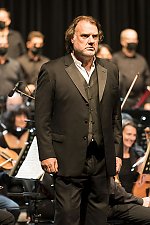
Sir Bryn Terfel als Pizarro
Wotan always has one hand covered!
I would like you to tell us about your future plans, any other issue you want to speak about to our audience?
What I have started looking at is something that I have been particularly afraid of, Schubert’s „Winterreise“. I have the famous recording of Hotter and Gerald Moore and listened to it many many times. I've never seen anybody sing „Winterreise“ because I felt that I didn't know the scope of this incredible journey and work. So, at last, I have opened the pages, the scores are not creaking anymore and I've blown away the dust [he sings]. So it is already starting to develop in my little music room here and I tell you, Deutsche Grammophon are very happy that I have started to learn „Winterreise“.
Great! And what about opera? Any other opera role?
In the future, I have the usual protagonists of the roles that I'm singing at the moment: Falstaff in a new production at Grange Park Opera next year, I told you in Munich “Tosca” is still not cancelled yet… I am in the time of my singing now that I can start looking at smaller roles that are not so prolific as the main principle roles like Balstrode in „Peter Grimes“ which I think is coming up a couple of times. I have been looking at Bartolo in the „Barber of Seville“…
What about Billy Budd?
Claggart, is „ein bisschen zu tief für mich“, it is too low, it’s a very bass role and the insinuation is in those very low notes…
I would love to hear you as Hans Sachs!
I think my Hans Sachs days are gone because he is not in my diary for the next three years and I can't imagine myself singing it when I am past my 60th birthday.
You look much younger though!
Well, we try. These young babies that keep arriving keep you young…
They make you younger immediately! Sir Terfel, I appreciate your time very much, thank you so much in the name of our readers, it was a pleasure talking to you and having got these new ideas and different views about what is going on. Maybe, we meet in Munich for a drink.
Definitely, that would be phantastic!
And, by the way, I have traveled many countries, but I was never in Wales. I have to come to Cardiff.
Yes, yes, you must! I think you might enjoy the welcome that you have in Wales and of course we have our museums and lakes and countryside… If you want to plan a visit of Wales always do it through the castles of Wales, Carmarthen Castle then Harlech Castle…
Okay, I wish you all the best for Graz!
Thank you, vielen Dank!
Vielen Dank! Be a grim Pizarro, frightening Pizarro…
[He sings with strong temper] Ok!
Ciao!
Goodbye!
Fotos: K. Billand 1; Photowerk Werner Kmetitsch 2-5
Klaus Billand






